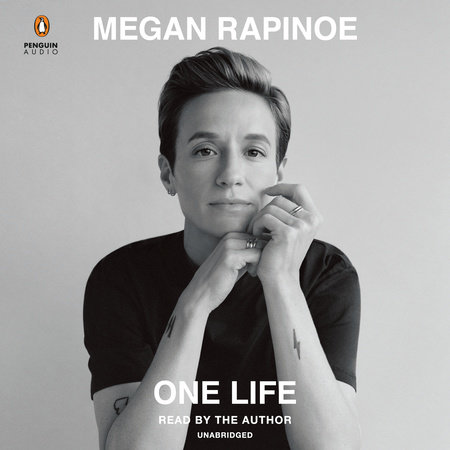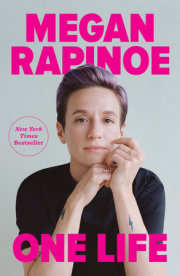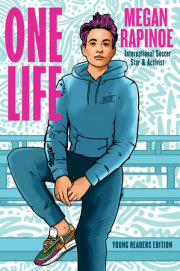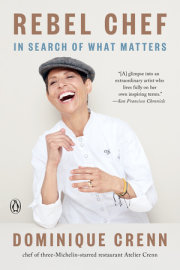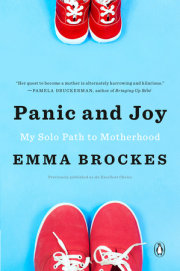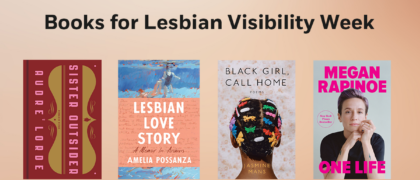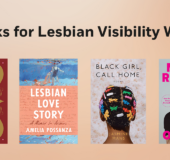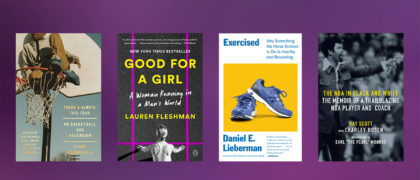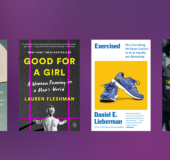STAND UP
I was on the team bus driving through the suburbs of Chicago when I picked up a call from my agent. It was September 2016, and my team, FC Seattle Reign, had just played the Chicago Red Stars in one of the last games of the season. That wasn’t why my agent was calling. Dan Levy had represented me for almost ten years and we’d been through a few things together. Five years earlier, he’d been a big part of the discussion around my decision to come out as the first, and for a long time practically the only, gay player on the US Women’s National Team—which is hilarious given the number of gays on the team—and he’d seen me through injuries and disappointments without losing his cool. Now he sounded concerned. “This is blowing up,” he said. The actual game that night had been nothing special. Chicago, like New York and Los Angeles, isn’t a soccer town, for reasons no one can quite put their finger on. You might get people out for a national team game, but no way are they turning up on a random Sunday night in September for a league match. We’d played to a small crowd of three thousand people and the score had been a lackluster 2–2. But at the press conference afterward, the first question out of the gate had little to do with the game itself: Had I intended to kneel during the national anthem, and if so, why?
I had anticipated being asked this question, of course. The decision to kneel wasn’t one I’d made lightly. At the same time, I hadn’t given much thought to how it might be received. In trivial contexts, I can be impulsive—the kind of person who dyes their hair pink the night before a huge tournament, for example—but it wasn’t that. If I didn’t rehearse outcomes before kneeling, it’s because kneeling, to me, felt more like an imperative than a choice. Any risk assessment I did wasn’t premised on how my actions might land, but on calculating the risk—huge, societal, unignorable, in my view—of doing nothing.
Still, I wasn’t expecting much of a backlash. Compared to football or baseball, soccer has a relatively low profile in this country, particularly at the league level. The nine teams in the National Women’s Soccer League are very competitive, but they don’t exactly dominate the sports pages. In the fall of 2016, even the national team—one of the most successful sports teams of all time—wasn’t riding especially high. A month earlier, we’d been eliminated from of the Rio Olympics in the quarterfinals, our worst result in an international tournament for years. I was personally off form, in the final stages of recovering from a knee injury. And the soccer season was about to end. I was also a woman athlete. At thirty-one, I was a veteran of two World Cups and two Olympic Games, with a history of mouthing off at least as long as my playing record. Still, it seemed fair to assume that when it came to talking about politics, my voice would carry less weight than a man’s. Earlier that year, when members of three WNBA basketball teams had worn T-shirts emblazoned with black lives matter, it had triggered a flurry of interest before dying down. By contrast, when Colin Kaepernick, quarterback for the 49ers, had knelt before a game in San Diego a week earlier, the response had been swift and engulfing.
I had seen the footage of Colin kneeling. It was impossible to avoid. We were in an election year, and all summer the news had been dominated by stories of unarmed black Americans dying in police custody. Black Lives Matter had become increasingly visible. For a while, you couldn’t open The New York Times without reading about the disparity between the way black and white Americans were treated by the criminal justice system and our society at large. When Colin knelt, it had seemed to me a perfectly logical response to what felt like a state of emergency. “I am not going to stand up to show pride in a flag for a country that oppresses black people and people of color,” he said, and the invitation—surely everyone else heard it, too?—was clear.
The morning after I knelt in Chicago, a quick glance at my social media feeds confirmed the scale of my misapprehension. Dan’s heads-up the night before had been a tiny taste of what was to come: people were mad. Whoa, were they pissed. When I was younger, I had labored under the delusion that dating men might be a part of my future. This felt like a bigger miscalculation. It wasn’t just the volume of outrage; it was the sheer hysterical pitch of it. I had been expecting a few chin-stroking editorials or a hashtag at most. Instead there were death threats, threats of violence, and horrible language, most of them sent to Dan and his fellow agents, often accompanied by a prim note asking if they’d mind forwarding the message on to me. A guy identifying himself as a former fan said he was thinking of burning my shirt. I was called every name under the sun. As the photo of me kneeling spread across the internet, right- wing blog posts sprung up calling for me to be axed from the team, and I was a talking point on Fox News. I was totally blindsided.
I called my parents in Redding. It’s a small town in Northern California, a formerly prosperous outpost of the logging industry, now at the tail end of a long, slow economic decline. With the exception of Rachael, most of the rest of my family—parents, siblings, aunts, uncles, nephews, nieces—still live in the area and, my parents told me that morning, in between worrying about me, reeling at the scale of the coverage, and being mad that I hadn’t given them advance notice, they were all having to deal with the reactions of their conservative neighbors.
One by one my siblings started to check in. CeCé, who I think of as my oldest sister but is actually my youngest aunt on my mother’s side and by far the sweetest of us all, called to make sure I was OK. My oldest sister, Jenny, who with the best will in the world no one would describe as sweet, called in a state of alarm to tell me she was having to unfriend coworkers on Facebook after they kept posting links to articles that trashed me. Rachael was on a hiking holiday in the Swiss Alps. After three days in the mountains without wi-fi, she reached a village, turned on her phone, and watched as it practically vibrated off the table with messages—mostly from friends asking, “Have you seen what Megan’s done?!” She hadn’t, but was soon up to speed. We own a business together, Rapinoe SC, which runs soccer clinics for kids across the country, and through the company’s website, hate mail was piling up in her in-box, along with cancellations for forthcoming clinics. When she called me, she barely needed the aid of a satellite to be heard. “What the hell is going on?” she yelled.
I had a tough time coming up with an answer. As the team and I packed up in Chicago and prepared to fly to our next game in DC, the noise intensified. I had been disrespectful to veterans, I was anti- American, I was politicizing sports in a way that ruined them for everyone else. I had long, reasoned responses to each of these accusations, but first, I was furiously indignant. So we don’t think there’s police brutality going on? We don’t? OK. So that’s what you’re saying. You’re saying all this stuff doesn’t exist, and all these people’s experiences—they’re lying? The scale of the outrage seemed to me to underline the very problem we were addressing, which is that there is huge denial about race in this country, bolstered by white fragility.
Not all of the anger came from outside. My family rallied to my defense, as they always do, but that isn’t to say everyone agreed with me. My dad and I hadn’t seen eye to eye on politics for a while. Rachael, who totally approved of my politics, was still mad at me for not planning things out better, while other family members wondered aloud if kneeling was the best way to get my point across. The only person who, I imagined, might have been enjoying a straightforwardly positive response to what I’d done was my brother Brian. I hadn’t spoken to Brian in a while, but one grimly amusing result of my kneeling was that it pushed him several places down the league table of Rapinoe sibling to have caused the most trouble.
There was one person I desperately wanted to talk to. Sue Bird was a star player on the national women’s basketball team, who I had met at the Olympics in Rio that summer. After reconnecting briefly in Chicago, we had agreed not to meet up again until I’d returned to Seattle and broken up with my fiancée. I had never felt this way about anyone before, and in ordinary circumstances, it would have been enough drama to last me the year. Now, as the controversy around me raged on, Sue was the person I most wanted to be with and couldn’t. Not all the responses to my kneeling were bad. My Seattle team- mates, while largely baffled by what I’d done, were also quietly supportive, as was my team coach, Laura Harvey, and Bill and Teresa Predmore, two of the owners of the Seattle Reign. In the airport, on the street, and amid the torrent of abusive messages online, strangers came forward to offer encouragement. As tends to happen, however, the negative stuff took up the most space, and as journalists kept asking if I planned on kneeling again, I found myself in a familiar position. The quickest way to get me to double down on something is to tell me I can’t do it. It didn’t occur to me for a second that it might not be my decision to make.
Three days after the game in Chicago, the Seattle Reign played the Washington Spirit at a stadium in Maryland. As I was changing, Laura quietly came up and told me that the owner of the Washington team had decided to play the national anthem while we were still in the locker room, to deny me the possibility of kneeling. “That is fucking wack-ass,” I said, and burst into laughter. It seemed cowardly and dishonest, the worst possible way to deal with someone with whom you disagree. It also signified the beginning of a new phase, in which strangers swearing at me online was replaced by a worse phenome- non: people being polite to my face while trying to defuse my actions behind my back.
By “people” I mean the US Soccer Federation. Once they saw what was happening, they tried to shut down my protest. The strangest thing about this was dealing with something people of color must feel all the time: the out-of-body experience of having one’s basic reality denied. Every time I opened my mouth to talk about kneeling, or racial injustice, or police brutality, it was as if a chorus within the soccer world popped up to say: That isn’t happening, and the real crime is you disturbing the peace by even suggesting it. In fact, those who disagreed seemed to be saying: Not only is your protest illegitimate, but the anger directed toward you isn’t happening either, or at least people aren’t angry for the reasons you specify. I couldn’t get used to this. I understood that people were mad; I even understood, thanks to my dad’s dalliances with right-wing views, that people can be manipulated into blaming the wrong people for their problems. What I couldn’t understand was how anyone with half a brain or conscience could argue that there wasn’t an issue here worth protesting, or that action soon taken against me by the Soccer Federation was anything but an attempt to quiet me down.
The beginning of the end came on a Thursday evening in mid- September. It was the first time since kneeling that I’d played with the national team, on a very different stage from that of a league game, with higher stakes and a bigger audience—around ten thou- sand that night, in the stadium in Columbus, Ohio. It was an international friendly against Thailand and, as always, we were the favorites, ranked number one in the world to Thailand’s thirty-two. Before the game, Jill Ellis, the national coach, had been asked what she thought of my kneeling and said something vague about being “team first,” which, while it wasn’t a ringing endorsement, hadn’t struck me as particularly ominous. In pleasant 70-degree weather, the anthem started to play. I dropped to one knee.
I didn’t play the first half. In the second half, when I came in off the bench, a noise started to emanate from the crowd that, since it rose every time I received the ball and diminished every time I passed it, soon became unmistakable: booing. Three days later, in a friendly against the Netherlands in Atlanta, it would be much, much louder. (It figures; it was the South.) But that game against Thailand was critical in terms of the effect I believe the booing had on my coach. For Jill, the sound coming from the bleachers that night in Ohio was, I suspect, her first real taste of what had been going on in the wake of my kneeling. From that moment on, my relationship with her was in serious trouble.
Tunnel vision is a prerequisite for most professional athletes. Just as when you take a penalty kick in front of fifty thousand people— the ambient cheering settles into white noise—it turns out that the sound of ten thousand people telling you to go fuck yourself can also blend into a solid mass possible to ignore. I wasn’t disturbed by the booing that evening, nor during the game in Atlanta. If you want to be an asshole and boo social justice, I thought, go ahead, be my guest. But while we won 9–0 that night—a good result even by our standards— it would be my last celebration on the field for some time. After the game, US Soccer released a statement saying it expected players to stand for the anthem. The day after that, Jill told me she wasn’t starting me in the game in Atlanta. A few weeks later, I was told by Jill not to dress for two national team games, guaranteeing I wouldn’t set foot on the field, and with the exception of a training camp I attended in November, I wouldn’t be invited to train with the team again that winter, or the following spring. In early 2017, the US Soccer Federation formally banned players from kneeling during the anthem.
This should have been the worst time of my life. I was in the wilderness with no team, no training camp, and no workable relationship with my coach. And while I was still technically a team member—Jill hadn’t fired me, yet—what does that mean when you’re not even invited to train, let alone to play? My career as a national team player was shattered. I was out in the cold with no obvious path of return. And yet, as my agents discussed the possibility that I might never play for my country again, I didn’t feel despondent at all. I felt ignited. Everything in my life had been leading to this.
At the post-game press conference after I first knelt in Chicago, I hadn’t rehearsed what I was going to say. I didn’t need to. Still red- faced from playing, I said I had knelt in support of Colin and to start what I hoped was a more thoughtful conversation about race. It was a show of solidarity and, I said, a way to broaden the conversation about racial injustice to people who, to put it politely, might find me a less threatening messenger than Colin. It was something else, too. I wasn’t just familiar with the politics behind Colin’s protest; I felt them, in my own way. “I know what it means to look at the flag and not have it protect all of your liberties,” I said. “It was something small that I could do
Copyright © 2020 by Megan Rapinoe. All rights reserved. No part of this excerpt may be reproduced or reprinted without permission in writing from the publisher.

